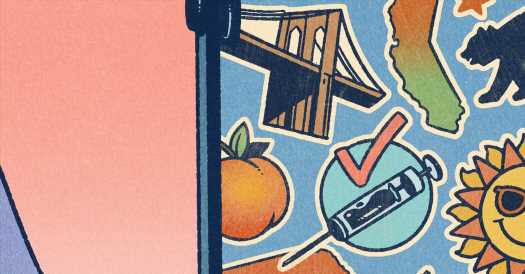Dear Tripped Up,
I’ve had my first vaccination shot and plan to book a flight to California two weeks after my second one. Like so many others, I have not seen my grandchildren for more than 15 months, during which time the baby became a toddler and the preschooler became a young boy. Now that some of us are getting successfully vaccinated and are planning on flying to see our families, I have a few questions that I’m hoping you can clear up. Margot
Dear Margot,
1. Is it safe to travel by subway, train, bus or plane after I have been vaccinated? What are the proper protocols for protecting others?
Even before the vaccines arrived, mass transit was rarely labeled by health officials with blanket terms like “safe” or “unsafe.” Studies conducted over the summer suggested that when certain criteria are met, subways are safer, from a viral-transmission standpoint, than one might assume. A trove of new research indicates that the chance of contracting the coronavirus while flying is low. For trains and planes alike, the focus is — and will continue to be — concrete, actionable measures that mitigate risk, like high-efficiency air filtration, enhanced disinfection, mask requirements, social distancing and capacity limits.
With that in mind, let’s rephrase your first question:
“It is safer for her, as the individual, to travel that way, and not herself get sick,” said Keri N. Althoff, an associate professor of epidemiology at the Johns Hopkins Bloomberg School of Public Health, deliberately emphasizing those italicized words.
“We know that vaccines protect the person who has been vaccinated from getting really, really sick to the point of hospitalization or death,” Dr. Althoff said. “But we don’t know whether or not a vaccinated person can still become infected and transmit either asymptomatic infection or very mild unnoticed infection. We’re still waiting for the data.”
52 Places to Love in 2021
We asked readers to tell us about the spots that have delighted, inspired and comforted them in a dark year. Here, 52 of the more than 2,000 suggestions we received, to remind us that the world still awaits.
Only about 8 percent of the United States population has gotten at least one shot, according to the latest numbers, which means you’re in the minority right now; if you’re in line to board a plane, there’s a good chance the person behind you won’t have been jabbed yet.
That’s why the second part of your question is so important, and why the basic protocols for protecting others (masks, distancing, hand-washing) haven’t changed. It’s also why airlines and other transportation companies are nowhere close to getting rid of them. In fact, those protocols have only been strengthened in recent weeks by the Centers for Disease Control and Prevention, which has issued a mask mandate for all domestic transportation.
“I know it’s frustrating, especially for grandparents, because it almost feels like the goal posts have been moved again,” Dr. Althoff said. “But we’ve always said that you cannot just rip your mask off and run around like it’s 2019 once you’re vaccinated. We’ve all learned not only how important our individual health is, but also how interconnected we are.”
2. Do I need a negative virus test to fly if I have a vaccination card?
For the time being, vaccination cards don’t supersede — well, much of anything.
Last week, the C.D.C. enacted an order requiring a negative coronavirus test (or documentation of recovery) for all incoming international travelers (ages 2 and older), including United States citizens. The test must be completed within three days of departure and submitted to the airline before boarding, and there are no exceptions for antibody or vaccination status.
“It’s directly related to the fact that we don’t know if people who are vaccinated are also protected from infection and cannot transmit,” Dr. Althoff said. “So those guidelines are going to stay in place until the science says differently.”
There is currently no federal testing mandate for domestic flights like the one you’re hoping to take, but C.D.C. officials have said they’re “actively looking at it.” (On earnings calls last week, executives from several domestic airlines expressed the concern that such a requirement would further stymie the faltering industry.)
As for what those vaccination cards might mean in the future, experts are predicting a surge in third-party “health passports” that store test results, vaccination records and travel guidelines. Some, like CommonPass and the IATA Travel Pass, have already been tested on different routes and airlines and will be further assessed, to eventually be rolled out to the public in the coming months. But for now these apps are information guardians only: Travelers shouldn’t expect them to override testing mandates and other guidelines.
3. Do I need to follow each specific state’s quarantine regulations if I have been fully vaccinated? Such a requirement would make it very difficult to travel.
With the exception of New Hampshire, which now allows people who are 14 days past their second shot to skip quarantine, most states are still requiring fully vaccinated people to adhere to quarantine requirements.
“States are being conservative and waiting for that data,” Dr. Althoff said. “That’s why the C.D.C. and most public health leaders are not recommending any travel until things calm down. Vaccine or not, there are no silver bullets here.”
Sarah Firshein is a Brooklyn-based writer. If you need advice about a best-laid travel plan that went awry, send an email to [email protected].
Follow New York Times Travel on Instagram, Twitter and Facebook. And sign up for our weekly Travel Dispatch newsletter to receive expert tips on traveling smarter and inspiration for your next vacation.
Source: Read Full Article

